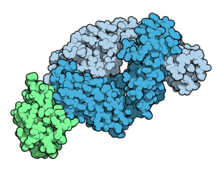Tralokinumab
 | |
| Monoclonal antibody | |
|---|---|
| Type | Whole antibody |
| Source | Human |
| Target | IL-13 |
| Clinical data | |
| ATC code |
|
| Identifiers | |
| CAS Number | |
| ChemSpider |
|
| UNII | |
| KEGG | |
| Chemical and physical data | |
| Formula | C6374H9822N1698O2014S44 |
| Molar mass | 143.87 kg/mol g·mol−1 |
| | |
Tralokinumab is a human monoclonal antibody which targets the cytokine interleukin 13,[1] and is designed for the treatment of asthma and other inflammatory diseases.[2] Tralokinumab was discovered by Cambridge Antibody Technology scientists, using Ribosome Display, as CAT-354[3] and taken through pre-clinical and early clinical development.[4] After 2007 it has been developed by MedImmune, a member of the AstraZeneca group, where it is currently in Ph3 testing for asthma and Ph2b testing for atopic dermatitis.[5][6] This makes it one of the few fully internally discovered and developed drug candidates in AstraZeneca's late stage development pipeline.
Discovery and Development
Tralokinumab (CAT-354) was discovered by Cambridge Antibody Technology scientists[7] using protein optimization based on Ribosome Display.[8] They used the extensive data sets from ribosome display to patent protect CAT-354 in a world-first of sequence-activity-relationship claims.[7] In 2004, clinical development of CAT-354 was initiated with this first study completing in 2005.[9] On 21 July 2011, MedImmune LLC initiated a Ph2b, randomized, double-blind study to evaluate the efficacy of tralokinumab in adults with asthma.[10]
As of 2016, MedImmune and AstraZeneca are developing tralokinumab for asthma (Ph3) and atopic dermatitis (Ph2b) while clinical development for moderate-to-severe ulcerative colitis and idiopathic pulmonary fibrosis (IPF) have been discontinued.[9]
Tralokinumab was licensed to LEO Pharma for skin diseases in July 2016. [11]
References
- ^ Kopf, Manfred; Bachmann, Martin F.; Marsland, Benjamin J. (2010). "Averting inflammation by targeting the cytokine environment". Nature Reviews Drug Discovery. 9 (9): 703–18. doi:10.1038/nrd2805. PMID 20811382.
- ^ "Statement On A Nonproprietary Name Adopted By The USAN Council: Tralokinumab" (PDF). American Medical Association.
- ^ Thom, G; Cockroft, AC; Buchanan, AG; Candotti, CJ; Cohen, ES; Lowne, D; Monk; Shorrock-Hart, CP; Jermutus, L; Minter, RR. "Probing a protein–protein interaction by in vitro evolution" [P]. Proc. Natl. Acad. Sci. USA. 103: 7619–7624. doi:10.1073/pnas.0602341103. PMC 1458619. PMID 16684878.
{{cite journal}}: Cite has empty unknown parameter:|displayauthors=(help) - ^ May, RD; Monk, PD; Cohen, ES; Manuel, D; Dempsey, F; Davis, NHE; Dodd, AJ; Corkill, DJ; et al. (2012). "Preclinical development of CAT-354, an IL-13 neutralizing antibody, for the treatment of severe uncontrolled asthma". British Journal of Pharmacology. 166 (1): 177–193. doi:10.1111/j.1476-5381.2011.01659.x. PMC 3415647. PMID 21895629.
- ^ "Pipeline". MedImmune. Retrieved 11 June 2013.
- ^ "Studies found for CAT-354". ClinicalTrials.gov. Retrieved 11 June 2013.
- ^ a b Human Antibody Molecules for Il-13, retrieved 2015-07-26
- ^ Jermutus, Lutz; Honegger, Annemarie; Schwesinger, Falk; Hanes, Jozef; Plückthun, Andreas (2001-01-02). "Tailoring in vitro evolution for protein affinity or stability". Proceedings of the National Academy of Sciences. 98 (1): 75–80. doi:10.1073/pnas.98.1.75. ISSN 0027-8424. PMC 14547. PMID 11134506.
- ^ a b "Tralokinumab - AdisInsight". adisinsight.springer.com. Retrieved 2016-02-20.
- ^ Clinical trial number NCT01402986 for "A Phase 2b, Randomized, Double-blind Study to Evaluate the Efficacy of Tralokinumab in Adults With Asthma" at ClinicalTrials.gov
- ^ https://www.astrazeneca.com/media-centre/press-releases/2016/astrazeneca-enters-licensing-agreements-with-leo-pharma-in-skin-diseases-01072016.html
